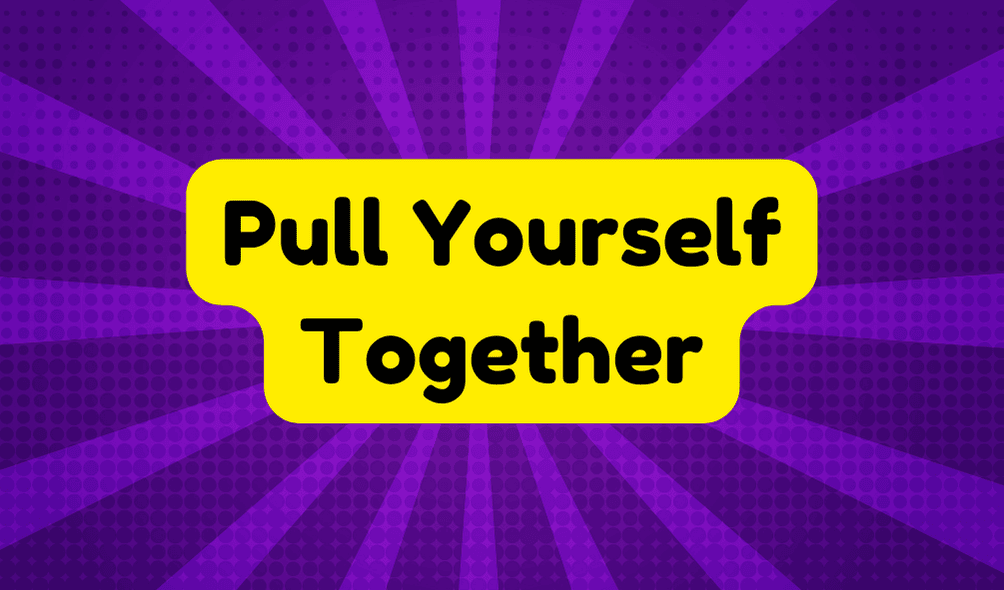"Pull yourself together" signifies the ability to regain emotional control during difficult times. While it encourages self-resilience, the phrase can oversimplify the complex nature of personal struggles. Synonyms such as "compose oneself" and "regain control" highlight the importance of emotional management. However, relying solely on self-reliance may neglect the significance of support from others. Understanding this balance can foster personal growth. Exploring the origins and usage of this phrase reveals deeper insights into emotional resilience.
Synonyms
The phrase "pull oneself together" carries a robust meaning, but it can sometimes feel tiresome in its frequent use. The need for emotional resilience and effective self-control strategies evokes many synonyms that can invigorate communication. Consider these alternatives:
- Compose oneself
- Regain control
- Steady oneself
- Center oneself
Each term emphasizes a similar quest for balance and emotional management. However, the synonyms often lack the depth and nuance that "pull oneself together" offers. The challenge lies in adopting the essence of emotional strength in a world where true composure requires both awareness and adaptability, beyond mere phrases.
Example of Sentences
Pulling oneself together is essential in challenging situations, yet many struggle to do so effectively. The following examples illustrate the complexity of emotional resilience and personal growth:
- After a difficult loss, pulling oneself together is crucial to embrace life again.
- Following a major accident, it becomes essential to regain composure.
- Amidst hard days at work, one must focus on priorities.
- During personal crises, fulfilling responsibilities requires self-control.
These instances reveal that pulling oneself together is not merely about pretending to feel better, but about cultivating genuine emotional strength amidst adversity and promoting lasting personal transformation.
Origin
Tracing the origins of popular idioms can often reveal surprising insights into their evolution and usage. The idiom "pull yourself together" surfaced in printed records during the late 1800s, although its precise origins remain uncertain. Linguists have conducted extensive research into its idiom history, noting how language evolves to express emotional resilience. The phrase reflects humanity's inherent ability to regain control over emotions after adversity. Its early adoption in literature and speech suggests a growing societal recognition of the need for composure in challenging situations. Such exploration sheds light on the complex interplay between language and human emotional experiences.
Collocations
Collocations related to the idiom "pull yourself together" reveal how language shapes the expression of emotional resilience in various contexts. These phrases encapsulate techniques that encourage self-control and coping:
- Pull oneself together – indicates restoring composure.
- Gather oneself – suggests collecting thoughts and emotions.
- Compose oneself – highlights the importance of maintaining calm.
- Regain control – emphasizes recovering emotional steadiness.
Understanding these collocations can foster a pragmatic approach to emotional resilience and self-control techniques. While intuitive, the subtleties behind these expressions illustrate complex psychological processes that are integral yet often overlooked in the pursuit of personal strength and stability.
How to Use in Everyday Language
When faced with challenging situations, the phrase "pull yourself together" often serves as a reminder to regain composure and manage emotional responses. Its everyday usage can foster emotional resilience, prompting personal growth. Below is a concise overview of contexts where this phrase is effective:
| Context | Application | Outcome |
|---|---|---|
| After Trauma | Regaining focus | Enhanced resilience |
| Professional Setbacks | Encouragement among peers | Collective strength |
| Personal Crisis | Motivating self and others | Forward momentum |
Why Is It Still Relevant Today?
Resilience remains an essential quality in maneuvering life's challenges, making the phrase "pull yourself together" relevant even today. In an era where emotional resilience is often tested by unprecedented events, this concept promotes personal growth essential for modern individuals. It encourages people to regain composure amid turmoil, fostering a proactive mindset rather than succumbing to crisis-driven inertia. However, some may argue that relying solely on self-reliance overlooks the need for community support. Consequently, while "pull yourself together" serves as a motivating call to action, it must be balanced with awareness of interconnectedness and the value of seeking help when necessary.






